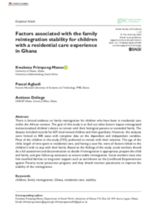There is limited evidence on family reintegration for children who have been in residential care within the African context. The goal of this study is to find out what factors impact reintegrated institutionalized children’s desire to remain with their biological parents or extended family. The dataset included records for 659 interviewed children and their guardians. However, the analyses were limited to 408 cases with complete data on the dependent and independent variables.
Most of the children in the study (73%) preferred to remain with their relatives. The age of the child, length of time spent in residential care, and having a case file, were all factors linked to the children’s wish to stay with their family. Based on the findings of the study, social workers should do a full assessment and documentation to decide if reintegration is appropriate, prepare the child and family, and give follow-up assistance to ensure stable reintegration. Social workers must also link reunified families to long-term support such as enrollment on the Livelihood Empowerment against Poverty social protection program, and they should monitor placements to improve the stability of the reintegration.
Related:
- Residential Homes for Children in Ghana: Compliance with Standards, Quality of Care, and Case Management
- The Role of Resilience Processes in Education and Well-Being Outcomes for Separated Children in Uganda: Exploring Street-Connected Children’s Pathways Through a Resilience-Based Programme and Beyond
- Intersectional Yet Individual Experiences: The Importance of Acknowledging, Conceptualising and Contextualising Separated Childhoods
- The Critical Intersection Between Child Reintegration and Community Connectedness: An Experience from Guatemala
- Beyond Family: Separation and reunification for young people negotiating transnational relationships

